Israel-Hamas War: What happened on Day 109?
Egypt-Israel ties at risk over Philadelphi Corridor • Three fallen IDF soldiers named on Monday • IDF launches western Khan Yunis push
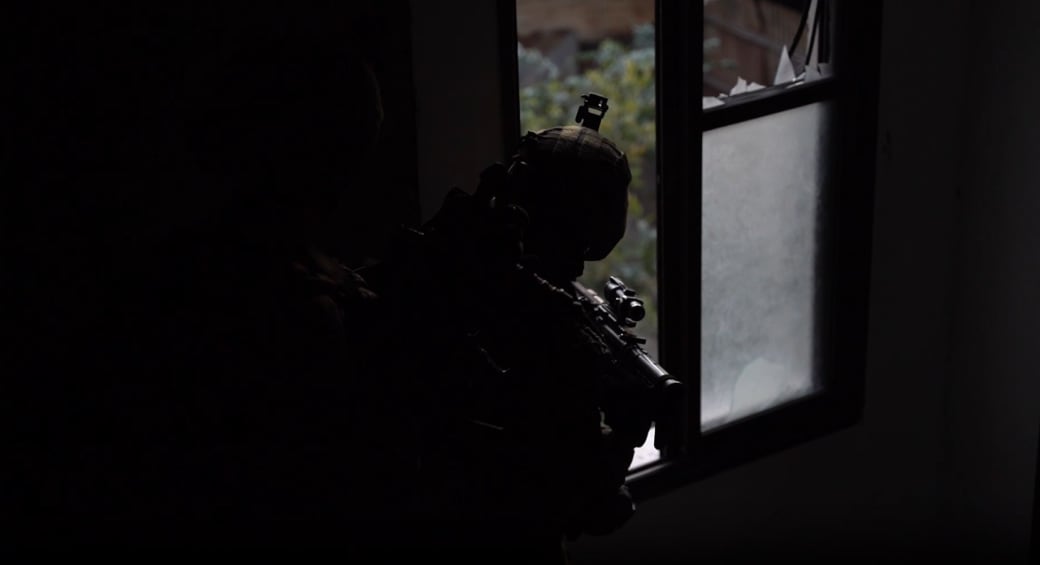

Hamas causes buildings to collapse - 21 IDF soldiers dead, several injured
This news comes after three soldiers were killed in battle the day before.
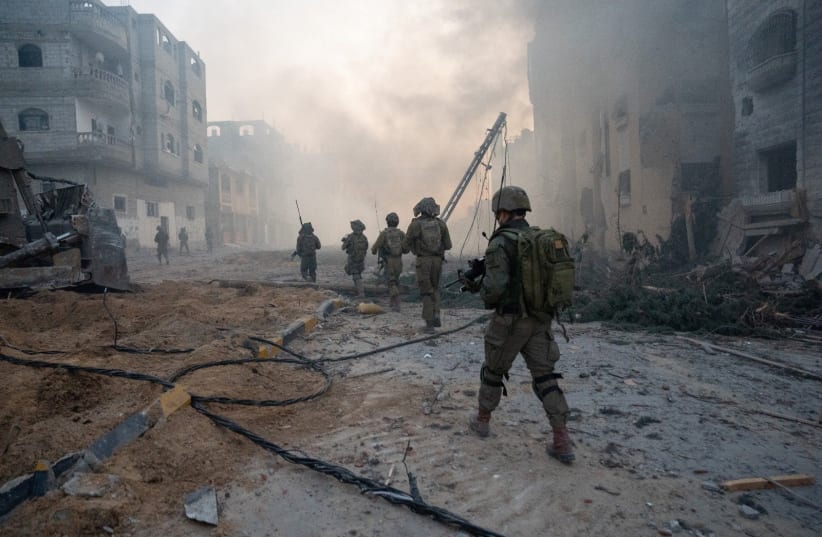
The IDF announced the death of 21 reservists fighting in the Gaza Strip on Tuesday.
Hamas forces fired a rocket-propelled grenade on multiple adjacent structures, along with landmines that the IDF forces had collected and brought into the buildings, which caused a total collapse that killed 19 soldiers and injured several others on Monday.
The incident occurred around 4:00 p.m. in al-Muasi in central Gaza.
In addition, a separate rocket-propelled grenade was fired on an IDF tank which killed two IDF soldiers and injured two others.
Details of the massive explosion are being investigated
It was unclear if the soldiers had violated procedures by bringing the landmines into the structures with them and also unclear how much the collapse of the building was caused by the RPG versus the secondary landmines explosions.
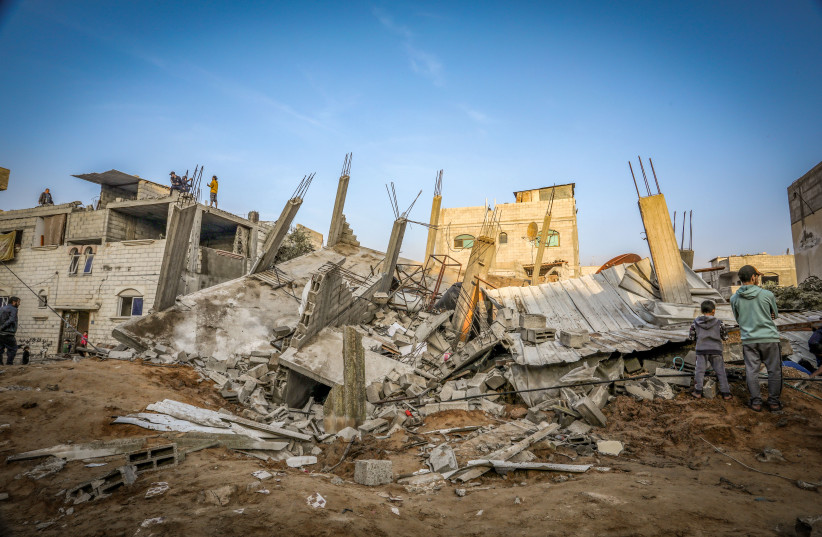
The IDF forces who were harmed were mostly reservists assigned to clear certain areas of dangerous items, such as mines.
Rescue activities went on for hours with the brigade commander having been on site from the start of the incident.
It was unclear what happened to the Hamas attackers.
Names of the soldiers killed
The IDF released the names of 10 soldiers of the 21 that were killed.
Maj.-Gen. (res.) Matan Lazar, 32, from Haifa, a soldier from the IDF's 6261 Battalion, 261's Brigade.
Maj.-Gen. (res.) Hadar Kapeluk, 23, from Moshav Mevo Beitar, and was a Class Commander in the IDF's 8208 Battalion, 261st Brigade.
Sgt.-Maj. (res.) Sergey Gontmaher, 37, from Ramat Gan, who was a soldier in the IDF's 8208 Battalion, 261st Brigade.
Maj. (res.) Elkana Yehuda Sfez, 25, from Kiryat Arba, was a soldier in the 8208 Battalion, 261st Brigade.
St.-Sgt. (res.) Yoval Lopez, 27, from the settlement Alon Shvut in the West Bank, a soldier in the 9206 Battalion, 205th Brigade.
Maj. (res.) Yoav Levi, 29, from the city Yehud-Monoson in central Israel, who was a soldier in Battalion 8208, 261st Brigade.
Maj. (res.) Nicholas Berger, 22, from Jerusalem, who was a soldier in the 8208 Battalion, 261st Brigade.
Maj. (res.) Cydrick Garin, 23, from Tel Aviv-Yafo, who was a soldier in the 8208 Battalion, 261st Brigade.
St.-Sgt. (res.) Rafael Elias Mosheyoff, 33, from the town Pardes Hanna-Karkur near Haifa, was a soldier in the 6261 Battalion, 261st Brigade.
St.-Sgt. (res.) Barak Haim Ben Valid, 33, from Rishon Lezion, class commander in Battalion 6261, Brigade 261.
Names of additional dead soldiers are expected to be announced once the IDF has been able to fully verify their identities and contact their relevant families.
Israeli officials' comments
Israeli President Isaac Herzog wrote that "behind every name whose world has fallen apart - a family that we take to our hearts with sorrow and pain, and at the same time with pride - for the heroism of the generation."
Defense Minister Gallant stated, "On this difficult and painful morning, the enemy's message reaches many homes in Israel; our hearts are with the dear families in their most difficult time. This is a war that will determine the future of Israel for decades to come - the fall of the fighters is a requirement to achieve the goals of the war.
"I send my condolences from the bottom of my heart to the families of the victims of the campaign and best wishes for a speedy recovery to the wounded."
Finance Minister Bezalel Smotrich described the incident as "heartbreaking news. Condolences from the bottom of my heart to the families of the heroes, the entire nation of Israel embraces you with a broken and aching heart. Our commitment is to ensure that the fall of our soldiers will not be in vain."
Knesset Speaker Amir Ohana said, "It's a difficult morning for the people of Israel to wake up to this heartbreaking news. On behalf of the Knesset, I would like to send my heartfelt condolences to the families of the fallen. Each of them is a world full of families, hopes, and dreams that were cut short prematurely. We all wish and pray for a speedy recovery of the wounded."
Yesh Atid Leader Yair Lapid said that he "sends a hug to the families of the soldiers. The entire nation of Israel is with you in your difficult time. May their memory be a blessing."
Agriculture Minister and security cabinet member Avi Dichter said, "Most of the soldiers were reservists, who left entire families without a father and an entire country shocked and in pain."
Go to the full article >>Hostage deal possible, but no ‘real’ Hamas proposal, Netanyahu claims
In a special video message on Sunday night, Netanyahu described Hamas's terms to free some 132 hostages in Gaza as those of “capitulation,” adding that he “utterly” rejected them.
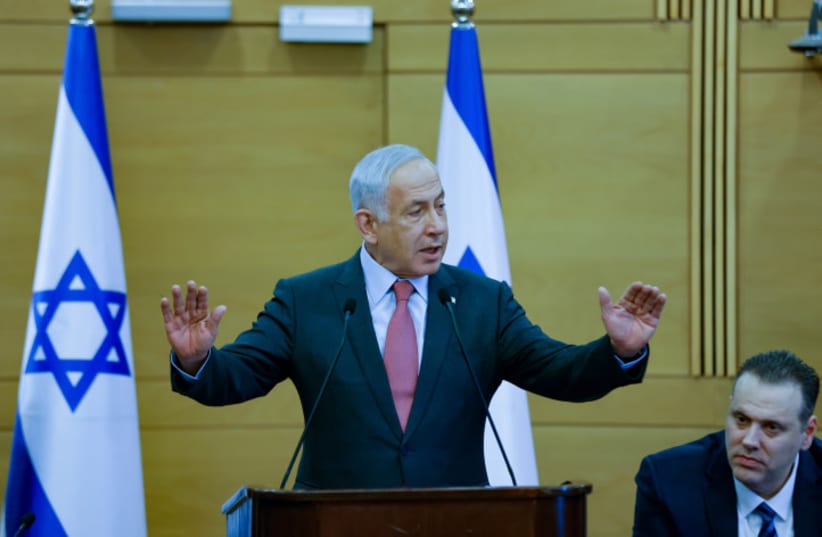
Israel has proposed a hostage deal but has not received a genuine proposal from Hamas, Prime Minister Benjamin Netanyahu said Monday.
“There is an initiative of ours, and I will not elaborate,” he told representatives of the captives’ families when he met with them.
Netanyahu spoke after a Wall Street Journal report that mediating countries Egypt and Qatar had proposed a three-phased 90-day process to secure the release of all the hostages, which would involve an Israeli agreement to free Palestinian security prisoners and to largely withdraw IDF forces from Gaza.
The proposal stoked the largely extinguished hopes that some kind of a proposal might be in the offing.
Hamas’s terms to free 132 hostages in Gaza constituted “capitulation,” Netanyahu said a video message Sunday night, adding that he “utterly” rejected them.
In his meeting with the hostages’ families, Netanyahu dismissed the possibility that a relevant Hamas proposal was on the table.
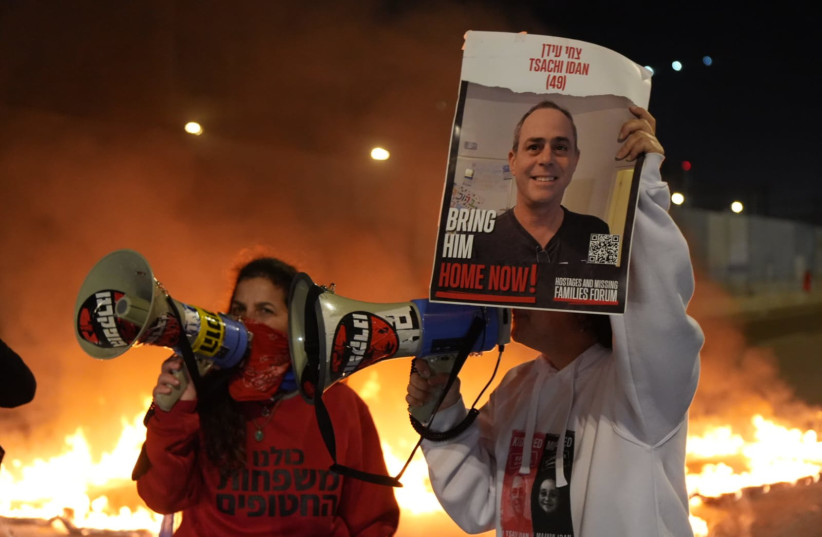
“Contrary to what is being said, there is no genuine proposal by Hamas,” he said. “This is not true. I will say this as clearly as I can because there are so many incorrect [reports] that are certainly causing you pain.”
An Israeli official on Monday told The Jerusalem Post: “Netanyahu wants very much to promote the release of hostages. He is working to advance this while safeguarding the vital interests of the state, which require the destruction of the organization of sadistic murderers Hamas.”
Netanyahu spoke while under increasing domestic pressure to make a deal – even if it means ending the war, which has no end date in sight or even clear goalposts by which to measure how close the IDF might to be driving Hamas from Gaza.
Past decisions and where they led
Labor Party leader Merav Michaeli on Monday told her Knesset faction: “To bring our hostages home, we must also be prepared to stop fighting. You can’t keep muttering, ‘Bringing the hostages home is above all else.’ You can’t keep on lying by saying, ‘Only total victory will ensure the elimination of Hamas and the return of all our hostages.’ It will take a very long time to bring down Hamas – time that we do not have, and time that they [the hostages] don’t have.
And we don’t have time to keep putting them in clear and immediate danger, day after day after day.”
For a decade, she said, she had warned Netanyahu about the dangers of his policies, including his decisions to hand the terrorist group “suitcases of dollars to build rocket launchers and tunnels.”
“Where were you for 10 years when we shouted and warned you?” Michaeli said. “You can’t have it both ways. It’s either stopping the war now, or continuing it and abandoning the hostages. You can’t keep on saying both. These word games mask the obvious decision you must make. The State of Israel must clearly state that the hostages take priority.”
National Unity MK Gadi Eisenkot on Thursday told Channel 12’s Uvda program the only way to bring the hostages home was through a deal.
Finance Minister Bezalel Smotrich (Religious Zionist Party) on Monday told his Knesset faction the military campaign was one of the tools that enabled Israel to press for a deal, and ending the war would eliminate its effectiveness.
It is not possible to end the war prior to destroying Hamas and to secure a deal for the release of the hostages, he said.
“There is no Israeli or Jew in the world who does not feel the heart-wrenching pain and the deep sorrow over [the fate of the] innocent women, adults, and children who are now held captive by the Nazi murderers in Gaza,” he said.
“Israel is obligated to do everything in its power to bring them home,” Smotrich said. A “responsible leadership” must “look these dear people in the eye” and tell them that Hamas’s demands for a deal endanger the state’s nine million residents and open the door for a repeat of the October 9 massacre, he said.
The idea that it would be possible to halt the war for several months and then “eliminate Hamas is eye-catching science fiction” that underestimates the strength of the enemy, Smotrich said. It was the type of miscalculation that has already harmed the country’s security, he added.
The IDF must therefore continue “courageously” with its campaign, “despite pressure from the US and others,” Smotrich said.
Earlier in the day, family members of the hostages forced their way into a Knesset Finance Committee meeting in the Knesset and demanded that the MKs do more to try to free their loved ones.
One woman held up pictures of three family members who were among the 132 remaining hostages, out of the 253 seized during the October 7 Hamas attack. Another 110 have been freed alive, and the IDF has returned the bodies of 11 of the hostages.
At this point, the woman said, she was hoping for “just one.” “I’d like to get back alive, one out of three,” she said.
Other protesters held up signs that said: “You will not sit here while they die there.”
“Release them now, now, now,” they chanted.
Families and supporters have also started camping outside Netanyahu’s home in Caesarea and at the Knesset.
“We will not leave him until the hostages are back,” said Eli Stivi, whose son Idan is being held in Gaza.
Regular weekend rallies demanding that the hostages be released have in recent weeks been reinforced by demonstrations calling for an election that might topple the right-wing government.
In the Knesset on Monday, parliamentary ushers, often quick to eject hecklers or protesters, initially tried to block the families but then stood by during the ruckus in the Finance Committee. One MK covered her face with her hands.
Committee chairman Moshe Gafni (United Torah Judaism) stood up and called a halt to the economic briefing under way and sought to calm the protester.
“Redeeming captives is the most important precept in Judaism, especially in this case, where there is an urgency to preserving life,” he said, adding: “Quitting the coalition would not achieve anything.”
Outside the Prime Minister’s Residence in Jerusalem – on Aza Street, Hebrew for Gaza Street – the Hostages and Missing Persons Families Forum set up a vigil calling for a hostage deal to be advanced.
“If the prime minister decides to sacrifice the hostages, he should show leadership and honestly share his position with the Israeli public,” the forum said in a statement.
Reuters contributed to this report.
Go to the full article >>How does Hamas use psychological warfare to enhance its position?
Experts say Hamas hostage videos and propaganda aim to push Israelis to urge the gov't for a cease-fire in return for the hostages, and to increase pressure on Israel to cease Gaza operations.
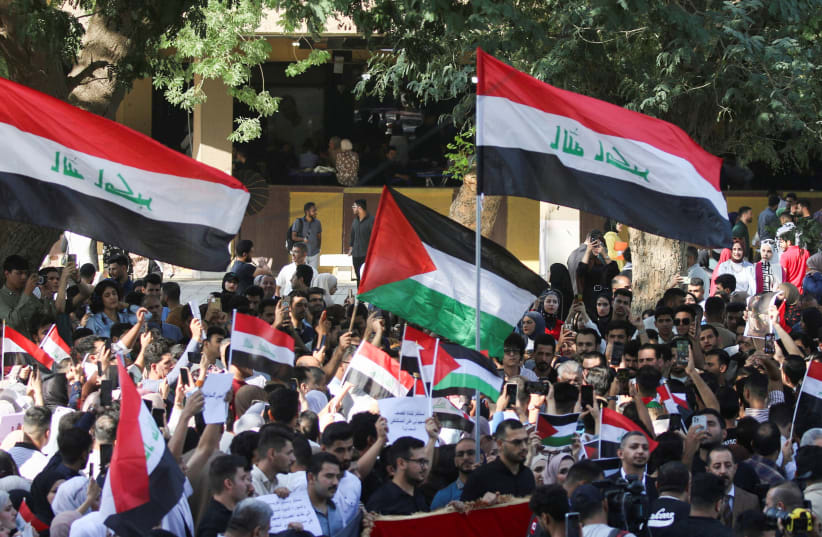
Last week, Hamas released a video of 26-year-old Israeli hostage Noa Argamani saying that two of her fellow hostages, Itai Svirsky and Yossi Sharabi, had been killed, along with a photo of two bodies that Hamas claimed were those of the two men.
One day earlier, the terrorist organization had released a different video, showing all three hostages stating their names and places of residence and urging Israeli Prime Minister Benjamin Netanyahu to stop the war in Gaza. Following that first video, Hamas encouraged the public to guess the fates of the three hostages and whether they were alive, injured, or dead.
"Hamas persistently employs psychological tactics against the Israeli public in an effort to enhance its position and survive the conflict in Gaza," Dr. Omer Dostri, a researcher at the Jerusalem Institute for Strategy and Security and an expert on national security and military strategy, told The Media Line.
He said the Hamas tactics include orchestrating a malicious media campaign focused on manipulating the emotions of the Israeli public, particularly over people held captive by Hamas.
"The objective of this psychological warfare related to the abductees is to prompt as many citizens as possible, especially the families of the captives, to exert pressure on the Israeli government," he said.
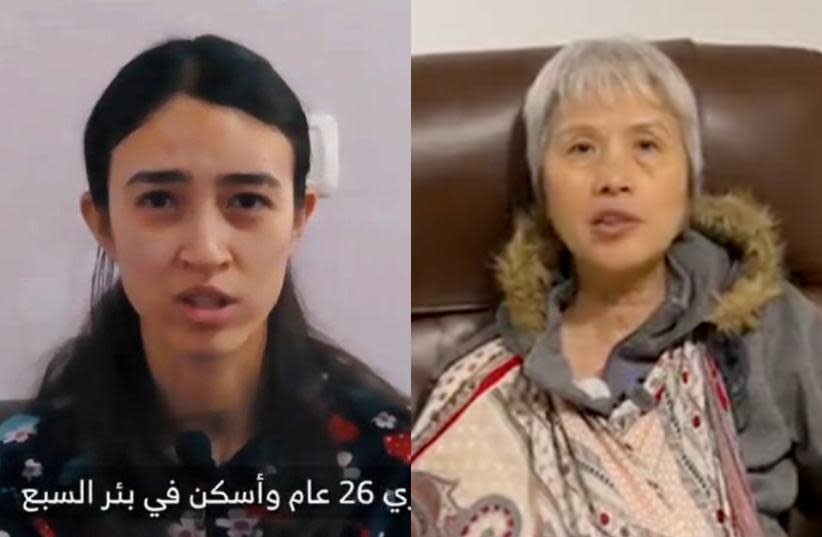
"Hamas believes that by leveraging public sentiment, it can avoid the governmental and military dismantling of its organization."
The Israeli authorities believe that there are still 132 hostages in Gaza, of whom at least 25 are no longer alive. Hamas terrorists abducted over 240 people into Gaza during their murderous rampage in Israel on Oct. 7. Since then, 110 hostages, mostly women and children, have been released, most of them during a week-long cease-fire and hostage release deal at the end of November. Among those still in captivity are about 15 women, as well as elderly people and young children.
Hamas propaganda aims to disrupt Israeli morale
Dr. Ron Schleifer, a psychological warfare analyst at Ariel University, told The Media Line that the Hamas propaganda campaign aims to disrupt Israeli morale and show that fighting Hamas does not pay.
Schleifer said that the terrorist organization aims to make the Israeli public feel that "Hamas will always be more clever and an ominous enemy, also that the war effort is useless, and Hamas is much more cruel and ruthless than Israel, and that Israel eventually is going to lose. This is the goal of the persuasion campaign."
Schleifer said that Hamas has three target audiences for its messages, with the first being the Palestinian people.
"You have to persuade your home audience, to make them feel like the ongoing suffering is a worthwhile cause," he said.
The second is the enemy, Israel, to show that it is useless to fight Hamas because it will win.
The last target audience, Schleifer said, is the international arena, all those parties who are not directly connected to the conflict but have an impact on it.
"Sometimes, if you send a message to one target audience, it can conflict with your interest for another target audience," he said.
For example, by releasing women and children during the cease-fire, "Hamas believes it has successfully portrayed itself as acting in a humanitarian manner on the international stage," Dostri said. However, this "humanitarianism" is contradicted by the many hostages Hamas is still holding, including women, children, elderly people, and injured male and female soldiers.
However, he said that when there is such a conflict, Hamas finds ways to deal with it and mitigate the damage.
Speaking of Hamas' claims of thousands of civilian casualties in Gaza, Dostri said "Hamas' dissemination of fake news, disinformation, and misinformation in the media regarding alleged civilian casualties in Gaza has effectively generated international pressure on Israel." Dostri said. This even extended to the point that South Africa initiated a trial against Israel at the International Court of Justice in The Hague.
"Rather than urging Hamas to release the abductees, many countries worldwide, including Western liberal democracies, tend to criticize Israel. In terms of global perception, it seems, albeit paradoxically, that Hamas holds an advantageous position in the battle for public opinion against Israel," Dostri said.
Schleifer said that regardless of whether the propaganda techniques are counterproductive for Hamas' international image, they have an impact on Israeli society and in that way, achieve Hamas' goals.
"This interview is a sign that it is working, people are interested, people are frustrated," he said.
He said that Hamas measures the traffic of videos on social media, and how many times their acts are mentioned in Israeli and international media.
"Nowadays it's all very methodological and very computerized to see the effectiveness of the acts," he said. "This is a ruthless game, but it is still effective. If you cannot kill your enemy, at least impact its psychology. Once they cannot use the firepower, they use the power of psychology."
Dostri pointed out that two key members of Israel's war cabinet, Benny Gantz and Gadi Eisenkot, support another temporary pause in the conflict to facilitate the return of the hostages, while Netanyahu and Defense Minister Yoav Gallant oppose a cease-fire, believing that sustained military pressure on Hamas could prompt it to seek a new deal or lead to the release of hostages through special forces operations.
Go to the full article >>Hamas releases propaganda doc denying atrocities, blaming Israel for civilian deaths on Oct 7
In a 16-page document, the terror group seeks to justify the October 7 massacre, denies its atrocities committed against civilians, and brand itself as a “national liberation” group.
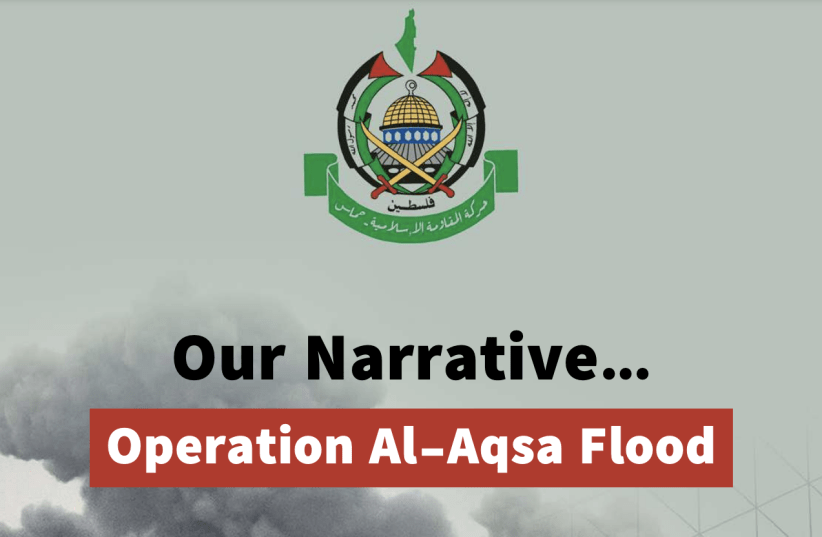
Hamas has published a 16-page document presenting a justification for its actions on October 7. The document denies that the terror group committed atrocities against civilians, and calls for an international investigation into the events of the day, branding Hamas a “national liberation” group, battling “colonialism.”
On its front and back covers, the document features pictures of Gazans on an Israeli tank, as well as images of paragliders reminiscent of the early phases of the assault.
The document, titled “Our Narrative: Operation Al-Aqsa Flood,” is addressed to “Arab and Islamic nations” and “free peoples worldwide.” It is divided into five parts: a narrative of the Arab-Israeli conflict; an account of October 7; a call for an “international investigation” of what happened; a presentation of the terror group itself; and a set of demands and calls to action.
The first section of the document presents the conflict as a 105-year battle by Palestinians against “colonialism.” It makes reference to the Balfour Declaration and the British Mandate, and recounts the formation of Israel by “Zionist gangs” while “the Palestinians were denied from [sic] the right to self-determination.”
The document levies accusations against Israel related to the Six Day War, West Bank settlements, and the supposed “Judaization” of the al-Aqsa Mosque in Jerusalem; it also makes reference to the issues of Palestinian prisoners, the blockade of Gaza, and the denial of a Palestinian right of return— maintaining, all the while, that the United States is complicit in Israel’s actions.
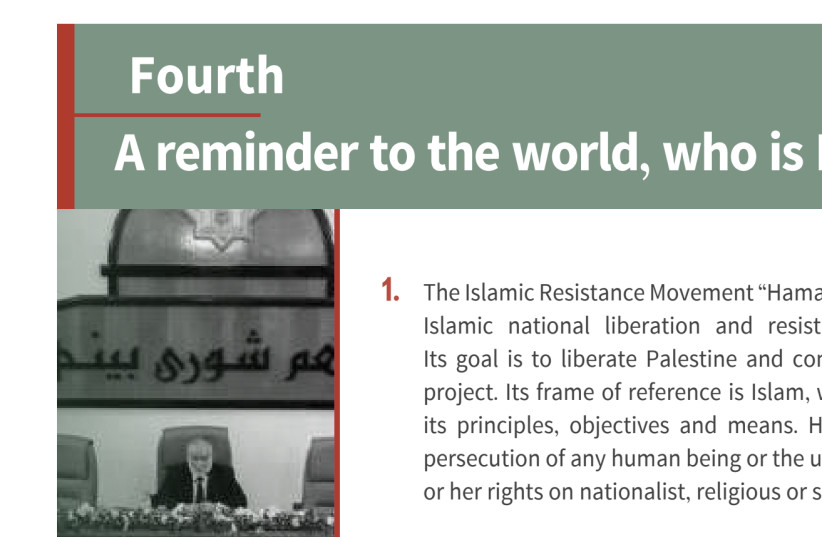
Denying atrocities on October 7, blaming Israel for civilian deaths
Hamas’s account of the October 7 attacks alleges that the “operation…targeted the Israeli military sites… and sought to arrest the enemy’s soldiers.” It avoids any mention of the bloody raids on Israeli towns and Kibbutzim.
It also avoids any mention of the approximately 240 people that Hamas took captive on October 7 as hostages, only implying their captivity in a claim that Israeli operations in Gaza were responsible for their deaths.
The document boasts of the Hamas terrorists’ “religious and moral commitment,” claiming that the “Al-Qassam Brigades fighters…avoid[ed] harm to civilians, especially children, women, and elderly people.” It adds that “if there was any case of targeting civilians; [sic] it happened accidentally and in the course of this confrontation,” and “maybe some faults happened during… implementation due to the rapid collapse of the Israeli security and military system.”
The terrorist group claims that “testimonies by Israelis” show that Hamas “did not target civilians,” invoking the “lie of the 40 beheaded babies”— a ‘debunked’ claim that was never in fact made by any Israeli press or spokespeople— and a report by the anti-Israel outlet Mondoweiss that reported a “lack of any evidence of mass rape.” The group blames Israeli helicopters for killing “many” of the 364 civilians massacred at the Nova music festival, saying that Hamas “had no prior knowledge of it.”
Additionally, the document says, “it must be known that conscription applies to all Israelis above the age of 18,” and that “all can carry and use arms.” The document calls Israel “an army with a country attached,” insinuating that all Israelis can be considered legitimate targets. Finally, the document alleges hypocrisy on the part of those who would accept civilian casualties as collateral damage in Gaza while condemning Hamas’s actions during its massacres on October 7.
Calls for an investigation in The Hague
The document calls for an “independent investigation,” insisting that such a probe would prove “the truth of our narrative and… the scale of lies and misleading information in [sic] the Israeli side.” This leads into the document’s third chapter, calling for an investigation by the International Criminal Court to look at “the broader context” of the October 7 attack as part of the “struggle against colonialism.”
The fourth section of the document, titled “A reminder to the world, who is Hamas,” seeks to rebrand the organization, designated as a terrorist group by the US, UK, Canada, Australia, and the EU— as a “national liberation and resistance movement.” The document refers to several clauses in Hamas’s updated charter from 2017, alleging that the conflict is not with the Jews, but rather with Zionism. The section condemns “what the Jews were exposed to by Nazi Germany,” despite Hamas officials’ repeated denials of the Holocaust and their use of antisemitic rhetoric, and praises Muslim nations for having provided Jews a “safe haven” for centuries.
The document says that Hamas receives their legitimacy from the “Palestinian right to self-defense, liberation and self-determination,” claiming that according to “all norms, divine religions and international laws,” as well as the Geneva convention, parties are granted the right to resist by any means necessary, including armed resistance— especially, the group says, when facing “the longest and brutalist [sic] colonial occupation,” as well as “massacres” and “oppression.”
Finally, Hamas says that “Occupation is occupation no matter how it describes or names itself” and calls on all countries around the world to back “Palestinian resistance” and support the Palestinians’ “struggle for liberation.” The terrorist group calls on its allies to “support… the Palestinian resistance,” to charge Israel with crimes, to mobilize against “Israeli aggression” on Gaza, and to stop governments from providing further aid or arms to Israel.
Jerusalem Post Staff contributed to this report.
Go to the full article >>Israel-Hamas War: What you need to know
- Hamas launched a massive attack on October 7, with thousands of terrorists infiltrating from the Gaza border and taking some 240 hostages into Gaza
- Over 1,200 Israelis and foreign nationals were murdered, including over 350 in the Re'im music festival and hundreds of Israeli civilians across Gaza border communities
- 132 hostages remain in Gaza, IDF says